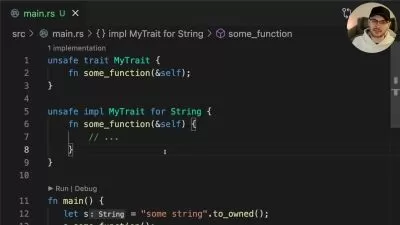Master The Rust Programming Language : Beginner To Advanced
FastBit Embedded Brain Academy,Kiran Nayak
9:55:57
Description
Learn Rust(Latest Edition) programming step by step with hands-on exercises, from basics to advanced levels.
What You'll Learn?
- Fundamental concepts of Rust programming language
- Ownership and borrowing rules
- References
- String and String slice
- Rust's package manager and build system (Cargo)
- Structures and Enums
- Unit testing in Rust
- Lifetimes
- Error Handling
- Pattern matching
- Loops and decison making
- More is yet to come ( Generics, traits, trait objects, smart pointers, closures, iterators and more)
Who is this for?
What You Need to Know?
More details
Descriptionprintln!("### Our new Rust course, designed for beginners, covers ###");
println!("### % fundamental to advanced topics % ###");
println!("### to build a strong foundation. ###");
Update #5
Iterators: Trait 'Iterator', Trait 'IntoIterator',
Creating custom iterator
Update #4
Traits: trait objects, virtual table, boxing DST, memory layout
Closures: as struct member fields, memory layout
Update #3
Closures: introduction, syntax
Closures capturing environment, traits associated with closures(Fn, FnMut, FnOnce)
Passing closures as function arguments
Update #2
Traits: introduction, methods
Associated types of a trait
Implementing custom Display trait
Trait bounds
Update #1
Generics: syntax, functions, structs, enums
Lifetimes: scope, annotations, elision rules
Lifetime annotations: structs, methods
Const. and static variables
Do you want to learn a new programming language?
How about The Rust Programming Language?
Rust is becoming increasingly popular in system-level programming due to its memory safety and performance. It stands as a strong competitor to C++ and is perfect for those looking to elevate their system-level programming skills. Whether you are a beginner or an experienced programmer, Rust offers a modern and powerful toolset for your development needs.
Learning Rust opens doors to high-performance, safe, and reliable system-level programming
2023 Stack Overflow Developer Survey findings indicate that,
"Rust is the most admired language, more than 80% of developers that use it want to use it again next year."
"More respondents want to continue using Cargo(Rust's official package manager) next year than the top competitors."
Why should you consider learning Rust?
There are many answers, but here are the important ones.
* Memory safety without garbage collection
* Better concurrency without data racesÂ
* Safe and unsafe code
* Performance friendly abstractions
* Rust is designed to be as fast as C and C++
*Â Awesome Tools and Ecosystem (Cargo (the package manager and build system), rustfmt (code formatting), clippy (linting), and a comprehensive standard library.)
* Built-in testing support
* Support for key Object-oriented programming principles
Why should you consider our course?
Our course is designed with beginners in mind. We use text, images, graphics, and animations to concisely demonstrate many intriguing concepts of Rust. This will build a solid foundation for you to understand the key concepts of the language. Also, we cover numerous small to large code snippets to demonstrate the concepts, allowing you to build complex programs.
Important Topics covered so far in the course
1. Variables and primitive data types
2. Ownership and BorrowÂ
3. Copy and Move semantics
4. Tuples and Pattern matching
5. Decision-making and Loops
6. Structs and Pattern matching
7. Enums and Pattern matching
8. Struct/Enum Methods and associated functions
9. Slices
10. String, String slice and UTF encoding
11. Lifetimes
12. Traits
13. Generics
14. Closures
12. More topics to come(Iterators, multi-thread , smart pointers, etc ). We constantly update this course to ensure you have the latest knowledge and skills
Hardware/Software Requirements
1. Windows/MAC/Ubuntu machine with Microsoft VS Code IDE installed
Note:
This course focuses on general Rust programming and does not specifically discuss no_std scenarios commonly used for embedded systems.
Who this course is for:
- Anyone interested in learning a new system-level programming language
- Students and professionals seeking to enhance their skills
println!("### Our new Rust course, designed for beginners, covers ###");
println!("### % fundamental to advanced topics % ###");
println!("### to build a strong foundation. ###");
Update #5
Iterators: Trait 'Iterator', Trait 'IntoIterator',
Creating custom iterator
Update #4
Traits: trait objects, virtual table, boxing DST, memory layout
Closures: as struct member fields, memory layout
Update #3
Closures: introduction, syntax
Closures capturing environment, traits associated with closures(Fn, FnMut, FnOnce)
Passing closures as function arguments
Update #2
Traits: introduction, methods
Associated types of a trait
Implementing custom Display trait
Trait bounds
Update #1
Generics: syntax, functions, structs, enums
Lifetimes: scope, annotations, elision rules
Lifetime annotations: structs, methods
Const. and static variables
Do you want to learn a new programming language?
How about The Rust Programming Language?
Rust is becoming increasingly popular in system-level programming due to its memory safety and performance. It stands as a strong competitor to C++ and is perfect for those looking to elevate their system-level programming skills. Whether you are a beginner or an experienced programmer, Rust offers a modern and powerful toolset for your development needs.
Learning Rust opens doors to high-performance, safe, and reliable system-level programming
2023 Stack Overflow Developer Survey findings indicate that,
"Rust is the most admired language, more than 80% of developers that use it want to use it again next year."
"More respondents want to continue using Cargo(Rust's official package manager) next year than the top competitors."
Why should you consider learning Rust?
There are many answers, but here are the important ones.
* Memory safety without garbage collection
* Better concurrency without data racesÂ
* Safe and unsafe code
* Performance friendly abstractions
* Rust is designed to be as fast as C and C++
*Â Awesome Tools and Ecosystem (Cargo (the package manager and build system), rustfmt (code formatting), clippy (linting), and a comprehensive standard library.)
* Built-in testing support
* Support for key Object-oriented programming principles
Why should you consider our course?
Our course is designed with beginners in mind. We use text, images, graphics, and animations to concisely demonstrate many intriguing concepts of Rust. This will build a solid foundation for you to understand the key concepts of the language. Also, we cover numerous small to large code snippets to demonstrate the concepts, allowing you to build complex programs.
Important Topics covered so far in the course
1. Variables and primitive data types
2. Ownership and BorrowÂ
3. Copy and Move semantics
4. Tuples and Pattern matching
5. Decision-making and Loops
6. Structs and Pattern matching
7. Enums and Pattern matching
8. Struct/Enum Methods and associated functions
9. Slices
10. String, String slice and UTF encoding
11. Lifetimes
12. Traits
13. Generics
14. Closures
12. More topics to come(Iterators, multi-thread , smart pointers, etc ). We constantly update this course to ensure you have the latest knowledge and skills
Hardware/Software Requirements
1. Windows/MAC/Ubuntu machine with Microsoft VS Code IDE installed
Note:
This course focuses on general Rust programming and does not specifically discuss no_std scenarios commonly used for embedded systems.
Who this course is for:
- Anyone interested in learning a new system-level programming language
- Students and professionals seeking to enhance their skills
User Reviews
Rating
FastBit Embedded Brain Academy
Instructor's CoursesKiran Nayak
Instructor's Courses
Udemy
View courses Udemy- language english
- Training sessions 55
- duration 9:55:57
- Release Date 2024/09/18











